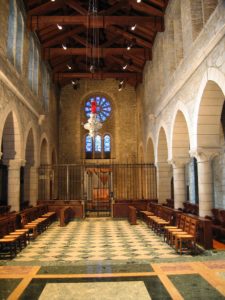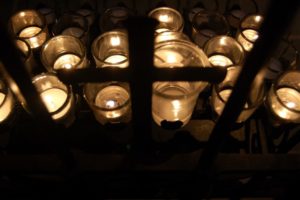By Brother Curtis Almquist of the Society of St. John the Evangelist (SSJE)
An ancient monastic principle about inner freedom: freedom to be fully alive is found in the context of limitation. This is quite counter-cultural. In western society we are identified as “consumers” in a market economy that is constantly alluring us with dissatisfaction, where what is next or what is new is promised to be better than what is now. We hear the pitch, “You can have it all … and you should,” as if more is more and never enough. Monastic wisdom counters this delusion with the elixir of “contentment,” a word which comes to us from the Latin contentus: to be satisfied or contained. Less is more. The grace of contentment presumes that what is, is enough.
Contentment is not passivity. Contentment is an active engagement with life now. It encourages you not to be seduced into believing you must stretch your soul ever broader, ever thinner, to take in ever-new experiences, taste new pleasures, hear new muses, master new skills, visit new worlds to be complete. Rather, contentment comes in growing your soul downward, deeper, into the ground of your being. Contentment is an active living into the depths of life now, today, given all the givens. We are invited to live into the provision and revelation of what is already at hand. Jesus tells us to learn the secrets of this from the created world: “Consider the lilies…” he says, and “Look at the birds of the air.”(1)
In contentment we are invited to savour our lives in every way we can, right now. Many of us have awakened to discover that the role we’ve been given in the play of life is not the part we thought we were trying out for. I oftentimes am saying to myself, “Who would have guessed that my life would include such-and-such?” Perhaps you know your own version of this. As we pray in Compline every night, life is full of “changes and chances,” over which we have little, if any, control.
The grace of contentment is particularly helpful when you have no choice, when life is defined or confined in ways which you may never have imagined or desired. Speaking of contentment, I am not extolling being a victim. Contentment is certainly not about staying put in a situation or relationship that is diminishing, or abusive, or numbing, and where your energies clearly must be directed toward a change or an intervention. Contentment is about being thankful everywhere and in every way you possibly can for the hugely challenging, utterly amazing gift of the life that God has shared with you. What surrounds you and fills you now is the portal through which God will be really present, what the eighteenth-century Jesuit spiritual director Jean Pierre de Caussade called “the sacrament of the present moment.”(2) The psalmist says, “Taste and see that the Lord is good.”(3) Presume the invitation to transcendence is immanent: God is with you. Now is the gift of today, which is a splendid gift indeed. Taste, see, say “yes” to your life in this moment.
Living in contentment is more about being than about doing, or acquiring, or mastering, or craving, or searching. Contentment means being satisfied given the limitations of your present life, including your life with God. You don’t need a special cushion on which to sit, nor a special lamp to light, nor a special incense to burn, nor a special prayer or mantra to recite, nor even a special monastery to visit. None of that is bad; it may well help. It is simply not enough. What is, is enough – for now. Start with what is now: with your breath; with what you can see and hear and feel and remember now. Pay attention to now, where God’s presence will be really present. Emily Dickinson said, “Instead of getting to heaven at last, I’m going all along.”
Wherever you find yourself along the path, presume you know enough. Presume that when you pray to Jesus, asking for Jesus’ guidance, Jesus will give you enough. Jesus is not going to tell you more, because you could not bear it. You have enough for now. If you knew what Jesus knows about your path ahead, you would be overwhelmed, or you could take a misstep, or you might shy away or flee. You know enough. You are being “hidden under the shadow of God’s wings,” being kept in the dark by God.(4) You have as much spiritual direction as you can bear right now. More will be revealed, but only when you are ready for the eyes of your heart to be enlightened. Meanwhile, you’re invited to watch and wait.
Waiting, like contentment, radically challenges our culture’s promise of instant gratification. Waiting is a wonder, which piques your soul’s attentiveness to God’s ongoing revelation. The grace of waiting will cure or clarify your desire. In the meantime, wait for God’s provision. (Provision will come, sometimes fulfilling your heart’s desire, sometimes not. I’ve found that one of life’s greatest gifts is not getting what I thought I wanted, only to realize, in retrospect, that it would not have been right.) Waiting “frontloads” the expectation that, in the fullness of time, you will have and know what you need. Rather than expending endless energy in worrying about the unknown or wondering, “What if…?” or “If only…” you wait. You wait expectantly. You wait, if you can, contentedly. The psalmist says, “My soul waits for the LORD, more than watchmen for the morning.”(5) The dawn comes, but not before the sun is ready. Remember that, if you are waiting in the dark; be content to know that God is not in the dark about what comes next. The light, the enlightenment, will come to you when you are ready or readied. God knows, and God knows what you don’t know, and God knows that you don’t know. T. S. Eliot wrote that “the faith and the love and the hope are all in the waiting. Wait without thought, for you are not ready for thought: so the darkness shall be the light, and the stillness the dancing.”(6)
To be content, to live in the grace of contentment, you must give consent. God is intent on forming you (or reforming you) into the beauty God created you to be, but first you must give God your consent, your co-operation. You might say, “Oh, that would be so difficult, to be so trusting of God.” Maybe so, but it’s not as difficult as not trusting God. You otherwise feign to carry the burden of authoring your life – the beginning and the end and the way in between – solely on your own shoulders. To be content you must surrender being your own god. Saint Ramuald, the tenth-century monastic founder of the Camaldolese order, writes:
…Realize above all that you are in God’s presence,
and stand there with the attitude of one who stands before the emperor.
Empty yourself completely and wait,
content with the grace of God,
like the chick who tastes nothing and eats nothing
but what his mother gives him.(7)
At the end of The Gospel according to John, Jesus is beside the Sea of Galilee talking with Peter and the Beloved Disciple. Jesus unveils what is ahead in life for Peter, beyond what he could ever have asked or imagined. Peter then points to the Beloved Disciple and asks Jesus, “What about him?” Jesus gives Peter a gentle retort: “What is that to you? Follow me.” It’s a good reminder to us all that we each have our own life script. Not to compare. Not to envy. Not to resent, but to consent to what God has in mind for us to be and become, to have and hold. Discontentment resists joy. Contentment claims the delight and wonder that informs God’s each passing moment, as it unfolds for us, around us, and within us.
One final word: Contentment is not one more thing to do. The way to contentment is found in surrender to God, in embracing the life God has entrusted to you. You need not go far off to discover the grace of contentment. Come home. Contentment is within your reach, waiting to be claimed.
- Matthew 6: 25-33
- Jean Pierre de Caussade, SJ (1675-1751), quoted from his Abandonment to the Divine Providence
- Psalm 34:8
- Psalms 17:8; 36:7; 57:1; 61:4; 63:7; 91:4
- Psalm 130:5
- T.S. Eliot in Four Quartets: East Coker, III.
- Quoted from “Brief Rule of St. Romuald” (c. 951-c.1027)
The Society of Saint John the Evangelist (SSJE) was founded in Oxford, England, in 1866. SSJE is the oldest Anglican religious order for men. SSJE Brothers live at the Monastery in Cambridge, Massachusetts, near Harvard Square and at their rural monastery, Emery House, in West Newbury, Massachusetts, a beautiful pastoral setting with gardens, meadows, fields, forests, and waterways. SSJE is a community of men giving our whole selves over to living the Gospel of Jesus Christ. Rooted in the ancient monastic traditions of prayer and community life, and critically engaged with contemporary culture, we seek to know and share an authentic experience of God’s love and mercy. We live a common life shaped by our daily prayer and worship, and informed by our contemporary Rule of Life. At profession SSJE Brothers make vows of poverty, celibacy, and obedience.
SSJE’s Guesthouses offer sanctuary and sustenance to many. Guests may come individually or attend a group retreat or one-day workshop focused on a topic of prayer and spirituality. Brothers lead these programs in our own monasteries and in church settings, schools, and conference centers throughout North America and the United Kingdom. SSJE Brothers serve as spiritual directors, confessors, teachers, and preachers. The Brothers also minister to students; to leaders in the church, academy, and business; and to prisoners and those who live in poverty.
SSJE has an active online presence at www.SSJE.org and offer a very brief meditation of encouragement and hope by email (at no cost) at the dawn of each new day: “Brother, Give Us a Word”: www.ssje.org/word














Beautiful.
Solace found reading this Brother Curtis.
(My beloved sister, Julie, shared your message, so grateful she did.)
I give thanks to God for the gift of my beautiful sister.
God’s song whispering through the poplar trees on our property this morning….I always find peace….contentment as I listen
Contentment is what we all want but are looking for it in all the wrong places. I love to read this as it inspires me and encourges me on my journey of life